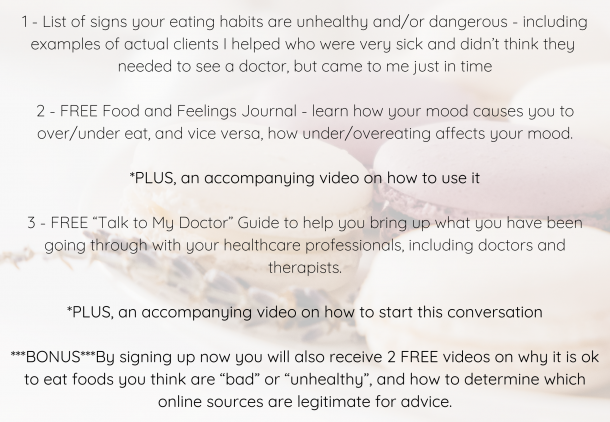A question I keep getting is, “when can we talk about specific foods?”
With all the “super foods” for health/weight loss/etc, everyone wants a magic bullet.
But, it’s not that simple. There are other things we need to consider before we can think about how turmeric and kale are going to change your life.
I came up with the “hierarchy of nutrition needs” to explain what is most important for you to be working on right now. Start at the top of this upside-down pyramid and see where you are at.
1) Enough food. The most important piece is simply to make sure you are eating enough food/calories to support your body. Low calorie diets, famine, food insecurity, these need to be conquered before we can move on to the following steps (Consult a Registered Dietitian for your unique calorie needs – please don’t use a book/article/formula to make up your own).
2) Balance of Macronutrients. Carbohydrates, fats, and proteins are our macronutrients, and we need all of them in proportion to have a healthy diet. In general carbs should make up 45-65% of your calories, fat should make up 20-35%, and protein 10-35%. Where on the range you fall depends on many factors including growth, type of activity, and medical issues like diabetes.
3) Spacing food out over the day. Once you have figured out how much to eat, it will really behoove you to space it out over your waking hours. I don’t care how popular intermittent fasting has become, your body likes a continuous trickle of nutrients coming in to keep it running at its best. Our body actually stores more fat when we eat too much food in a short period of time. If you had the same [foods/calories/everything exactly the same] on 2 different days, and one day you spaced it out with meals and snacks, and the other day you ate it all in a short time frame (2-4 hours), you would store more of that food as fat on he day you ate it all in a shorter period of time, and your body wouldn’t be able to use all of the nutrients. When in doubt- space it out!
4) Micronutrients. Micronutrients are vitamins, minerals, and phytochemicals in our foods that are a necessary part of our body function. These are nutrients like calcium, iron, and zinc. I’ll spare you the long boring lecture, but once you have the above mastered the next step is making sure you get the correct balance of micronutrients. In general, this is not something you need to calculate or be overly concerned about if you eat a wide variety and colors of foods.
5) Specific Foods. Only after figuring out the other steps should you think about what specific foods you are eating for health. As stated before, there are no “super foods” or “miracle foods.” That being said, it never hurts to try out different fruits/veggies and dishes. Just don’t take it to extremes. Even kale or carrots in excess can cause problems. As it is said, “the dose makes the poison” (-Paracelsus). Try to create balance in your diet and eat a rainbow of foods. You’ll feel better.


